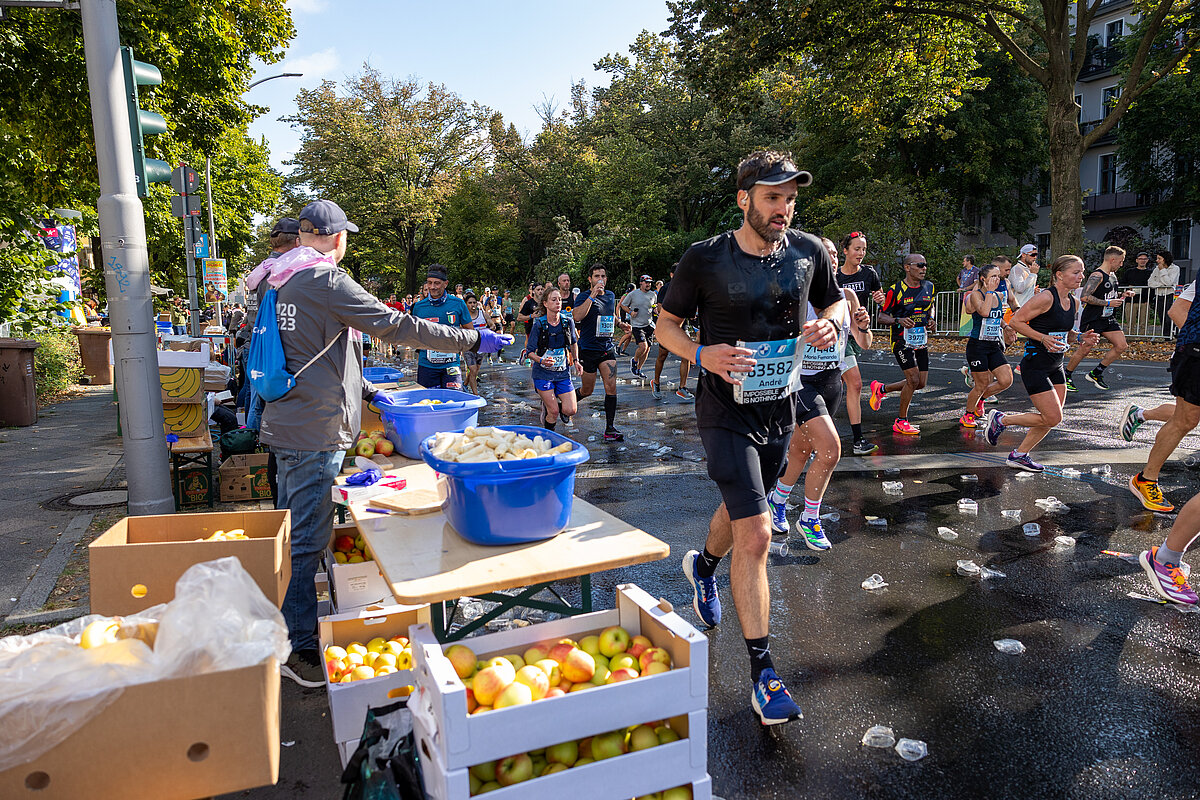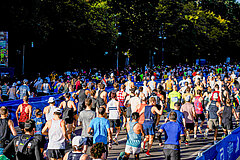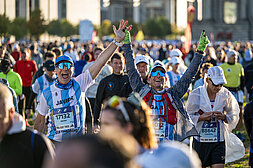The right sports nutrition for the BMW BERLIN-MARATHON
Run faster with the right food and drink
Alongside training and regeneration, nutrition is the third pillar for healthy and successful running on the way to the BMW BERLIN-MARATHON. In order to cover the increased energy requirements of a marathon, to convert training stimuli into performance-improving adaptations and to restore muscle structures and biochemical processes, the chosen food must provide essential nutrients in adequate quantity corridors.

Carbohydrates, for example from fruit, are regarded as the muscle fuel of runners - and the BMW BERLIN-MARATHON 2023 is no exception. © SCC EVENTS / Norbert Wilhelmi
Energy for optimal running training
There are only three classes of nutrients, known as "macronutrients", from which our metabolic machinery obtains the energy for all life's activities via complex breakdown and build-up processes. Carbohydrates and fats are the key energy suppliers for all endurance performance, whereas proteins are primarily responsible for building up the substance and function of muscles and other organ structures as well as for control and transport tasks in metabolic processes.
Basic fat nutrition for runners
Even in very lean athletes, subcutaneous fat forms a rich energy depot for ultra-long endurance performances of moderate intensity. In the basic diet, attention should be paid to fat quality with a predominance of unsaturated vegetable fats and oily sea fish (herring, salmon) and selected edible oils such as linseed, walnut and rapeseed oil containing omega-3 fatty acids.
Carbohydrates for endurance athletes
Carbohydrates provide quick energy for increases in intensity (speed). Their limited storability in the form of glycogen in the muscles and liver makes their depletion a performance-limiting component in endurance sports. Glycogen deficits and drops in blood sugar levels are performance killers. "Low-carb" is therefore not a recommendation for marathon runners. The blood sugar level also reacts highly individually to healthy complex carbohydrates (e.g. from wholemeal products).
Tip: The recommendation given by the International Society of Sports Nutrition for marathon endurance events of covering around 60% of energy requirements with carbohydrates, with an intake of 5-8 g of carbohydrates per day and kg of body weight, should be seen as a guide. A separate "trial and error" is required to determine the exact quantity and digestibility.
Protein recommendation for marathon runners
Often associated with "body-built" muscle packages, the adequate supply of protein in endurance sports cannot be emphasised often enough. Lean endurance muscles, their energy supply controlled by enzymes (proteins!), messenger substances and organic repair processes also require a protein intake that can be up to 0.8 and 1.6 g per day and kg of body weight, depending on the duration and intensity of the exercise. The combination of plant (pulses, nuts) and animal sources (fish, eggs, dairy products, meat) provides the most reliable supply of all the necessary building blocks (amino acids) for the body's own protein.
Remember: Marathon nutrition is not "rocket science", but a comparison of science with your own experiences and taste preferences.
Related News










BMW

BMW GERMANY - A STRONG PARTNER FOR RUNNING.
BMW has been the title sponsor of Germany's biggest marathon since 2011. At this running event, the world's elite come together to top the current best times.
Strength. Endurance. Efficiency. These are not only the most important attributes of a runner, but also apply to BMW's sustainable vehicles. BMW has been setting standards in sustainability for years and successfully demonstrates them at the BMW BERLIN MARATHON. But also before the event BMW accompanies the running community in their preparation and emphasizes the joy of running. With the perennial RUN FOR JOY campaign, BMW, supports the athletes in their preparation - together they make the impossible possible. The lead vehicle, the new BMW i5 supports the runners on the course. It has exactly the qualities needed for a successful marathon run: intelligent and responsible use of resources. And it is precisely with these skills that the all-electric vehicle guides the runners safely, purposefully and in an environmentally friendly manner through the capital.
More than 50 vehicles and around 15 scooters of the C evolution class are part of the fleet of support vehicles provided by BMW for the BMW BERLIN-MARATHON. In addition to the iX as a safety car, the latest i-models from the car manufacturer are also in use as shuttle and organization vehicles. With this commitment, BMW supports the sustainable development of modern technology and the sport of running.
adidas

Everything at adidas reflects the spirit of our founder, Adi Dassler. Improving the athlete’s performance was his goal; today, his legacy continues with the consumer at the heart of everything the adidas brand does.
The number of runners in Germany is constantly increasing. No matter where they come from, they all have the same goal: Improve. Better runners, better athletes and in the end a better version of themselves.
adidas Running has something for everyone – we want help each person achieve their individual goals. What counts is personal development, which goes far beyond the personal best.
Abbott

At Abbott, our 114,000 employees in more than 160 countries are devoted to advancing life-changing technologies that help people achieve their full potential. Our medical devices, diagnostic tools and nutrition products are designed to enable individuals to reach their personal best, however they define it. By sponsoring the Abbott World Marathon Majors, a series of the six largest and most renowned marathons in the world, including the BMW BERLIN-MARATHON, we are not just celebrating the pinnacle of physical endurance and determination – we are reinforcing our commitment to improving lives. The Abbott World Marathon Majors are a testament to health and the human spirit at their finest, showcasing that with the right support and determination, every finish line is within reach.
More on Facebook at www.facebook.com/Abbott and on Twitter @AbbottNews and @AbbottGlobal.
Zalando

Are you ready to take your running to the next level? As the official sponsor of the BMW BERLIN-MARATHON, Zalando is here to help you reach your goals. Running a marathon is challenging enough - you need the right equipment to feel completely comfortable. Our functional sportswear can do much more than just look good: From marathon training to relaxed runs - find your perfect outfit at Zalando and run with us!
GENERALI

Generali Germany has been our partner since 2018. The insurance group is part of the international Generali Group and thus also part of a company that is over 190 years old, its history and its heritage. In 2017, the company launched a new sponsorship strategy - “Generali moves Germany”.
The initiative aims to motivate people to lead active health and environmentally conscious lives. Taking part, not watching, is crucial here. In recent years, Generali has thus become one of the largest and most important sponsors in German running. Running promotes physical and mental health and thus has a preventive effect against numerous common diseases. Moreover, hardly any other sport can be practiced in such a resource-saving and environmentally friendly way. Together with the event organizers, Generali develops programs that make major events demonstrably sustainable: in the areas of environmental and climate protection and social commitment.
About 9 million customers are insured with the companies of Generali Germany, which include the brands Generali, CosmosDirekt and Dialog in the life, health and property/casualty segments. Generali's objective is to be a lifetime partner for its customers, offering innovative, individual solutions and services thanks to an excellent sales network in exclusive and direct sales as well as in the broker channel. Generali Germany is part of the "Germany, Austria and Switzerland" (DACH) business unit, which was newly created in 2022.
ERDINGER Alkoholfrei

ERDINGER Alkoholfrei refreshes all finishers behind the finish line. ERDINGER Alkoholfrei is the ideal beverage after sports: isotonic, rich in vitamins, and low in calories. And ERDINGER Alkoholfrei has only 125 kcl per 0.5-liter bottle! Because a varied and balanced diet and a healthy lifestyle are important!
EY

As official Partner and Sustainability Consultant of the BMW BERLIN MARATHON, EY aims to further advance the sustainable transformation in sports. To this end and together with the event organizer SCC Events, EY will develop a concept to make the marathon as sustainable as possible.
Also beyond the course, we go the extra mEYle every day: EY is one of the major German professional services organizations with more than 11,000 employees at 20 locations. Working across Assurance, Consulting, Law, Tax, Strategy and Transactions, EY teams ask better questions to find new answers for the complex issues facing our world today.
This includes EY helping clients to develop and implement suitable sustainability concepts. In addition, EY has many years of experience in advising companies and organizations in sports.
NORQAIN

NORQAIN – Official Timekeeper of BMW BERLIN-MARATHON
Embrace the thrill of precision and endurance with NORQAIN at the iconic BMW BERLIN-MARATHON. As the proud Official Timekeeper, family-owned and fully independent NORQAIN exemplifies a commitment to quality watchmaking and its challenger “my life, my way” spirit.
Just as runners push their limits on the track, NORQAIN's timepieces stand strong against the test of time, making every second count in the pursuit of excellence. At the heart of our collection lies the revolutionary Wild ONE collection. Crafted to endure the most demanding challenges, this ultimate high-performance sports watch is both ultra-robust and ultra-light making it a perfect companion for athletes and watch enthusiasts alike.
We’re beyond excited to announce that as a special tribute to celebrate the 50th anniversary of the iconic BMW BERLIN-MARATHON NORQAIN will be unveiling a limited edition Wild ONE BMW BERLIN-MARATHON timepiece in 2024.
Maurten

You probably know that you burn carbohydrates when you run – both in training and during the race. And how hard it can be getting the fueling right, without GI-distress.
Our Hydrogel Technology makes sure you get enough carbohydrates without risking the session or race. But there are no shortcuts – science has shown that training your guts makes a huge difference.
VILSA

Naturality meets sustainability
As a mineral water, VILSA accompanies you with refreshing purity and light mineralisation. But that's not all! We are committed to people, animals and the environment: as a family-owned, midsized company in its fourth generation, we see it as an obligation and the core of our company philosophy to stand up for nature and the conservation of our resources in order to preserve them for future generations.
Discover our variety of products and enjoy the natural freshness of VILSA.

























![[Translate to Englisch:] [Translate to Englisch:]](/fileadmin/_processed_/4/1/csm_Vater-Sohn-Freude_f8a7e6bd65.jpg)

![[Translate to Englisch:] [Translate to Englisch:] Erschöpft und glücklich im Ziel des BMW BERLIN-MARATHON 2024 © SCC EVENTS / Tilo Wiedensohler](/fileadmin/_processed_/d/e/csm_Erschoepft-im-Ziel_418cc7eee2.jpg)